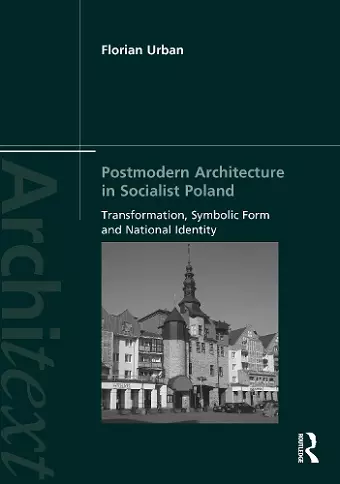Postmodern Architecture in Socialist Poland
Transformation, Symbolic Form and National Identity
Format:Paperback
Publisher:Taylor & Francis Ltd
Published:14th Dec '20
Currently unavailable, and unfortunately no date known when it will be back
This paperback is available in another edition too:
- Hardback£135.00(9780367860721)

Garish churches, gabled panel blocks, neo-historical tenements—this book is about these and other architectural oddities that emerged in Poland between 1975 and 1989, a period characterised by the decline of the authoritarian socialist regime and waves of political protest. During that period, committed architects defied repressive politics and persistent shortages, and designed houses and churches which adapted eclectic historical forms and geometric volumes, and were based on traditional typologies.
These buildings show a very different background of postmodernism, far removed from the debates over Robert Venturi, Philip Johnson, or Prince Charles in Western Europe and North America—a context in which postmodern architecture stood not for world-weary irony in an economically saturated society, but for individualised counter-propositions to a collectivist ideology, for a yearning for truth and spiritual values, and for a discourse on distinctiveness and national identity.
Postmodern Architecture in Socialist Poland argues that this new architecture marked the beginning of socio-political transformation and at the same time showed postmodernism's reconciliatory potential. In light of massive historical ruptures and wartime destruction, these buildings successfully responded to the contradictory desires for historical continuity and acknowledgment of rupture and loss. Next to international ideas, the architects took up domestic traditions, such as the ideas of the Polish school of historic conservation and long-standing national-patriotic narratives. They thus contributed to the creation of a built environment and intellectual climate that have been influential to date.
This book will be of great interest to students and scholars interested in postmodern architecture and urban design, as well as in the socio-cultural background and transformative potential of architecture under socialism.
"In Postmodern Architecture in Socialist Poland Florian Urban creates a complex view of Polish architecture of the 1980s. The author guides the readers through New Old Towns and prefabricated residential areas, prestigious sacral objects and the rural bottom-up churches. He goes beyond a dry description of listed buildings, establishing them in a wide context of socio-political changes. Urban proves that, although naming it as 'architecture of resistance' will be a simplification, postmodern architecture under the declining socialist regime was an agent of transformation."
Dr. Błażej Ciarkowski, Lodz University of Technology
"In this compelling new book, Florian Urban casts a completely new light on postmodern architecture, hitherto widely disparaged as a frivolous creation of American and Western European fashion-stylists working in an unholy alliance with neo-capitalist reactionaries. He shows how, semi-detached from Western postmodernism’s discourses of playful irony, a postmodernism of a different and altogether more socially embedded kind was able to emerge in a country such as Poland, where it significantly helped in the process of reconciliation following the traumatic ruptures of the 20th century."
Miles Glendinning, The University of Edinburgh
"Florian Urban describes the most interesting and important architectural implementations of Polish postmodernism by putting them into the wide context of political and economic changes in Poland in the 1980s and 1990s. It makes this book on architecture not only about buildings but also economic and social phenomena that are crucial for the end of the 20th century."
Anna Cymer, Architecture historian, author of Architecture in Poland 1945–1989
ISBN: 9780367860738
Dimensions: unknown
Weight: 420g
226 pages